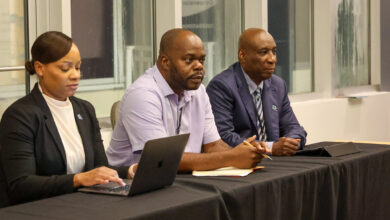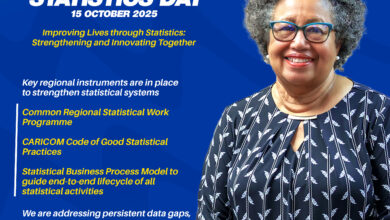The Right Honourable Owen Arthur, Prime Minister of Barbados and Chairman of the Conference of Heads of Government of the Caribbean Community
Honourable Samuel Hinds, Prime Minister of Guyana
Honourable Minister of Social Development of South Africa
Other Honourable Ministers
Your Excellency, the Ambassador of South Africa
Other Members of the Diplomatic Corps
Deputy Secretary-General, CARICOM, and other Members of Staff of the CARICOM Secretariat
Other Distinguished Participants
Representatives of the Media
It gives me great pleasure to address you today against the background of the theme “Fostering Sustained Global Dialogue for Africa and Its Diaspora; the case for the Caribbean”.
This dialogue is a tangible example of what can be achieved when parties work cooperatively towards a common good. Here, I refer not only to the collaboration between CARICOM and the Government of South Africa, but also to that between the Governments of Barbados and The Bahamas in relation to their agreement to combine the resources and activities of the Global Dialogue and CARICOM/AU Regional Consultation this year.
It is a celebration of unity and collaboration that today we have the collective inputs in one place. The Governments of The Bahamas, Barbados and South Africa, as well as the African Union are to be commended on their spirit of compromise, and readiness to work together.
Today we continue a process begun in 2005 in Jamaica when we were treated to that memorable presentation by Dr. the Hon. Ralph Gonsalves, Prime Minister of St. Vincent and the Grenadines. Since then, both the African Union and CARICOM have been working to strengthen our respective internal institutional arrangements. This Dialogue and its outcomes will hopefully catalyze and accelerate that process.
It is fitting that this Forum should take place in 2007, the year of the Two Hundredth Anniversary of the Abolition of the Trans-Atlantic Slave Trade; that pernicious crime against humanity – a virtual African holocaust.
As CARICOM reflects on the legacy of the slave trade, this Forum is a crucial building-block in enabling Africa and its Diaspora to be reunited by constructive dialogue and programmes for the betterment of the two civilisations.
The Caribbean Community has traditionally been active and forthright in focusing international attention on issues related to Slavery, the Slave Trade and the legacy. Indeed, it was CARICOM Member States that co-sponsored the Resolution adopted by the 61st Session of General Assembly of the United Nations, which designated 25 March 2007 as the International Day to mark the Abolition of the Trans-Atlantic Slave Trade. That Resolution also made provisions for the convening a special session of the United Nations General Assembly on March 26, 2007 to observe and reflect.
Earlier this year as we paid tribute to those who fought to end Slavery and the Trans-Atlantic Slave Trade, the leaders of some of the former Colonizing Powers expressed regret and deep sorrow for the role of their countries in the slave trade. However, the issue of reparation is still outstanding, and must be addressed by all concerned as a matter of urgency.
But reparations must be dignified outcomes of a consultative process, not mendicancy. One such outcome could be in the form of policies, and of resources, in support of the collective needs of Africa and its Diaspora, in areas of human and social development
This general approach to reparations was reflected in the address delivered by The Right Honorable Owen Arthur, Prime Minister of Barbados, in his outstanding William Wilberforce lecture at Holy Trinity Church, Hull, in the United Kingdom on 25 March 2007. In that forum, The Honorable Prime Minister proposed the establishment of the William Wilberforce Educational Fund to support scholarships for Caribbean students to study at universities in the United Kingdom; to finance student and teacher exchanges between African universities and the University of the West Indies; and to fund the establishment of a joint British-Caribbean Centre for Multi-racial Studies and Policy Development at the University of the West Indies, Cave Hill Campus. As a start this is an excellent model for the way forward.
Other approaches mooted include:
The establishment of a Task Force in CARICOM to examine the issue of reparations and to convene broad-based regional consultations on the matter.
And…..
The establishment of an International Commission by the United Nations, to investigate the social, political, economic and psychological consequences of slavery on people of African descent, in the context of reparation initiatives.
Recently, Heads of Government of CARICOM consulted with the Caribbean Diaspora in the United States in the context of the Conference on the Caribbean which was held in Washington in June 2007. The issues discussed were similar to those being explored in this Forum and could provide very useful examples of possibilities for linkages between Africa and its Diaspora wherever dispersed; issues such as the harnessing of skills, the scope for greater investments, the development of the youth and other vulnerable groups, and the strengthening of social and cultural linkages and exchanges.
Such Caribbean-African approaches have deep historical roots. One recalls the contributions of the early Pan Africanist of Caribbean origin such as Henry Sylvester Williams, Marcus Garvey, George Patmore and Norman Cameron, to name a few. One also cannot forget the more recent historical perspectives of the late Drs. Eric Williams and Walter Rodney, particularly in their seminal works, Capitalism and Slavery, and How Europe Underdeveloped Africa, respectively.
This Forum under the theme “ Fostering Sustained Global Dialogue for Africa and its Diaspora – case for the Caribbean “ provides the opportunity for exploring new strategies for the development of Africa and its Diaspora through South-South Cooperation and collaboration in the wider global arena.
To this end, it is noteworthy that the African Union has designated the Diaspora as the Sixth Region of Africa, in recognition of the vital contribution its Diaspora could make to the development of the Continent, including through advocacy in the international arena. CARICOM was identified as having, potentially, a major role as part of this Sixth Region.
The new forms of globalisation clearly require cooperation and collaboration among States at all levels. It is no coincidence therefore that both Africa and the Caribbean have recognised the need to address their challenges through regional integration and collective action.
This is the only approach which seems feasible. In my view, it is therefore most regrettable, that the efforts at cooperation amongst the African, Caribbean and Pacific Group of States (Intra-ACP Cooperation) petered out without any real achievement. That initiative had derived its origin from the 1975 Georgetown Agreement among the 46 developing States (now 78) which formally created the ACP Group of States, which States had earlier that year, (February 1975) entered into a cooperation Agreement – the Lomé Convention, with the European Community. The Intra-ACP dimension of the Georgetown Agreement was designed to pursue cooperation in Trade, in Transport and Communication, and Education and Culture. (South Africa was then not yet part of the ACP Group of States).
Many studies were done in the various areas, but the exercise ended up as another case of studies gathering dust on the proverbial shelf. If we are ever to achieve the objective of correcting what our history has dealt us, we need not only reparations from the erstwhile Colonizers, but also creative, determined cooperation among ourselves.
Our Caribbean Community (CARICOM) based on the principles of regional integration and cooperation is now 34 years old. Established in 1973 through the Treaty of Chaguaramas among its 12 original English-speaking Member States, it has grown in scope, membership and linguistic coverage, and now includes Dutch-speaking Suriname and French-speaking Haiti. Although it has been buffeted by the vicissitudes of internal and external dynamics; over time, the Community has been transforming itself to take advantage of the opportunities and face the challenges of the changing global environment. To that end, it is well on the way to becoming a Single Market and Economy, drawing in some measure from the European model.
Against the above background, one of the expected outcomes of this Conference, is a list of recommendations for the development of a mechanism to facilitate greater cooperation including private sector investment in a number of fields particularly in transport and communication, and information and communication technologies, between Africa and the Diasporic regions. In this regard, it must be noted that CARICOM is developing an Investment Regime which will promote the region as a single investment space, and which would thereby make it simpler for investors from Africa and the rest of the world to do business in CARICOM.
Undoubtedly, however, the most enduring bond between Africa, the Caribbean and other African Diasporas, is through culture; overtly manifested in language patterns, cuisine, music, art, dance, carnival and other rituals; and deeply rooted in our collective spirituality, familial and kinship patterns.
It was for this vision of a united “Africa for Africans, at home and abroad” that the great Pan-Africanist, the Rt. Excellency Marcus Mosiah Garvey, advocated so passionately throughout his life.
The Caribbean Community is particularly well-placed to demonstrate to the rest of the world the potential of Diaspora dialogue, given our location as the home of, not only African, but Indian, European, Chinese and other Asian Diaspora.
In conclusion, I wish to assure this gathering of the continuing commitment of the CARICOM Secretariat to this process: a commitment demonstrated by my office; The Office of the Secretary-General, spearheading Diaspora initiatives with support of the relevant Directorates.
The significant presence by the staff of the CARICOM Secretariat here today reflects the importance we attach to the outcome of the dialogue and to the consequent evolution of sustainable approaches to CARICOM/AU collaboration, including the identification of joint institutional structures and complementary resources to service this crucial initiative.
Your Excellencies, Ladies and Gentlemen, I thank you.





